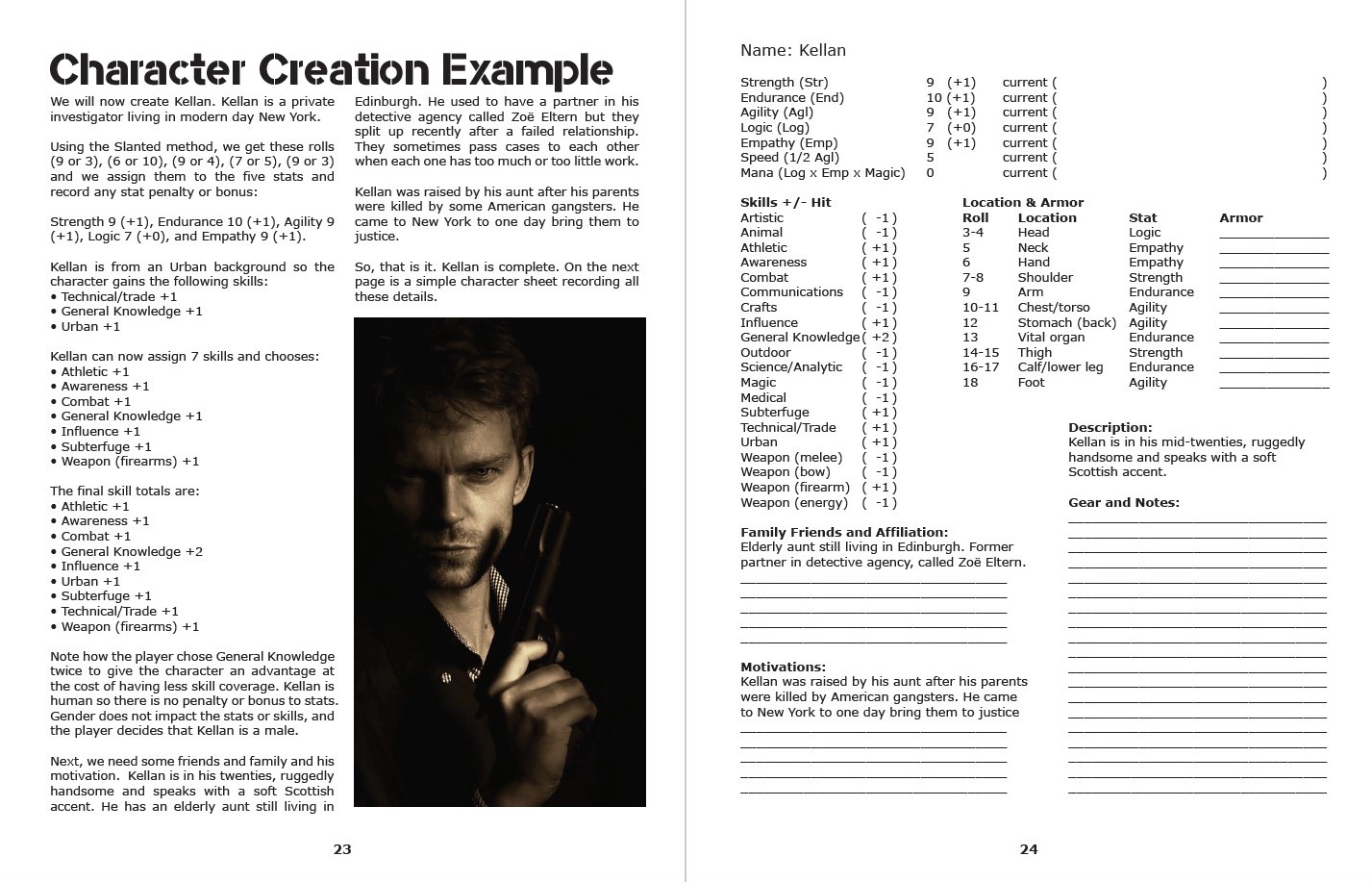The biggest single name in solo role play has to be the Mythic GME, Game Master Emulator. Almost every solo tool that uses look up tables shares at least some of its DNA with Mythic.
There is nothing wrong with Mythic, I have used it myself in the past. Once you have learned the way it works, and you can get to grips with all the tables and record keeping, it is easy to see why it is the market leader.
The strength of Mythic is also its greatest weakness. It is simply generic. Not only is it generic, but it is also dice and table heavy, which is often called “crunchy”. That crunch can mean that if you don’t know the system like the back of your hand, you end up spending more time playing with Mythic than you do playing the game you wanted to solo.
There are alternatives to Mythic. In fact there are many of them, I want to look at one alternative philosophy.
Mythic GME vs 3Deep
| 3Deep | Mythic | |
| Support Multiple Genres |  |  |
| Rules Light |  |  |
| Designed for World Building |  |  |
| Persistent Characters |  |  |
| Life Path Character Creation |  |  |
| Published Adventures |  |  |
| 3rd Party Publisher Support |  |  |
| Dice | 3d6 | d100 |
| Page Count | 72 | 144 |
| Cost | $9.99 (PDF) $14.99 (print+PDF) | $10 (PDF) $27.48 (print+PDF) |
Who are the games aimed at?

Mythic is aimed at players. It places greater emphasis on groups of players playing collaboratively, sharing the game mastering role in a pass the parcel process. The games start with a brainstorming, idea gathering period, just a few minutes, to gather ideas to be incorporated into the game. When the game starts the players take turns to use the Mythic GME rules to answer the questions that come up.

3Deep is aimed more squarely at game masters that do not get to play. That and game masters that like to create their own worlds. Gameplay assumes a single character and a sandbox world that perpetuates from game session to game session. To make things manageable it uses the idea of episodes, rather than distinct adventures, and story arcs are either season long, carried from episode to episode, or short and resolved in the current episode.
Character Creation
This is where the games differ more obviously. Mythic uses a customisation process, Everything has a rank and the rank is used for task resolution using the standard GME tables. Higher ranks make the likelihood of a yes result greater. The actual statistics, attributes, skills, abilities, and strengths and weaknesses in play can very from game to game, although most groups would soon settle down to a regular setup.
3Deep uses a “life path” character creation process. Your character has a race or species, five stats, a culture, and a set of skills. The game comes with very simple rules for creating races/species and cultures, part of its world building ethos. The skill list is brief enough to keep in memory for most people and broad enough to cover most genres. Beyond the core numbers part, characters are intengrated into the game world through person connections to NPCs and personal plot objectives. Once you have made a few characters the whole process comes down to about 5 or 10 minutes start to finish.
World Creation
Mythic is designed for any world. The game world is created during the idea gathering stage, before play begins and the character creations flows from it. The skills and abilities are tuned to the world the players want to play in. If you don’t want to do that pre-session planning, a randomised world can be created with a Q&A session using the dice.
3Deep offers three options. The first is the player created world. As mentioned above, there are rules for creating non-human characters and specific cultures. These lay down the foundations for any characters based upon them, leaving just assigning stats and choosing spending just seven skill points. The world is as the player imagined it and then supported by the rules.
The second option is that of the Q&A and letting the dice decide what the world is like. Frequently five to ten yes-no questions is enough for any solo system to give a clear idea of the sort of world you are in. 3Deep further supports this process with the character backgrounds seeding the world with active plot hooks.
The last option for 3Deep is splatbooks. At the time of writing there are two in print. The first is a Wild West genre book and the second is No GM’s Sky, a far future adventure of space exploration and a journey home. There are more splatbooks planned including a fantasy core.
Soloing The Game
Mythic is the elder statesman of solo role-playing. The system treats everything like an oracle question from does my sword hit the goblin to are there bars at the window. There is no distinction. Open questions use a pair of d100 rolls to get one of 10,000 possible word couples to inspire your answers. For a more physical game, there are Mythic playing cards that replace dice with cards drawn from a deck. As I said in the introduction, the game is not fast to play, but it is detailed. This is the advantage of the d100, it gives you many levels of granularity.
3Deep is a much faster game to play. It borrows heavily from Mythic and credits Tiny Solitary Soldiers for its solo engine. The entire solo system fits on half a page, and the most complex thing you will do is make a pair of 3d6 rolls. Most oracle questions will just be a simple 2-12 (2d6) roll. The stated aim of the design was to ‘get out of the way’, meaning that the rules should not interfere with your roll playing. The single page format means that there is no flipping back and forth to find the right table.
3Deep also offers an advanced option rule for open questions. This is contained on a second page. The two, core and advanced, can be placed side by side when playing. These are provided in a quick reference section at the rear of the book, either for printing or to have all the tables on just four pages at the back of the book, to save hunting for them.
If you have used Mythic then moving to 3Deep’s solo engine will be very easy. The biggest change would be getting used to the compact d6 tables instead of the d100 tables in Mythic.
Industry Support
Mythic is a closed system. There is the core role-playing game, the GME and some supporting books by Word Mill, such as the Location Crafter and Creature Crafter, that apply Mythic techniques to creating semi random adventure components.
3Deep has a free compatibility license. This allows any publisher to create compatible content, stamp it with a 3Deep logo and sell it. 3Deep is also released under the Open Game License. This is another way of freeing writers from constraints and allowing them to make variations on the game. 42 publishers have downloaded the compatibility license so far.
Conclusion
Mythic RPG is 144 pages of which 54 are the solo engine. 3Deep is 72 pages of which 4 are the solo engine. That direct comparison really illustrates how streamlined 3Deep. Price wise they is not a lot to choose between them. Mythic is $10(pdf)/$27.48 (print+pdf) and 3Deep, $9.99 (pdf)/$14.99 (print+pdf). 3Deep is a little cheaper but it is a lighter set of rules.
In play, 3Deep was written by game masters for game masters. It encourages persistent worlds, characters and solo campaigns in the style of TV episodes and seasons. If you are looking for inventory management and encumbrance rules you won’t find them here.
Mythic is more freeform and collaborative and is designed more for players without a GM. Mythic is shines at one-shot games where you are playing supers today, last week it is grimdark fantasy and next week you will enter the world of James Bond.
Although 3Deep is the lighter ruleset, it manages to cover more situations. There are rules for car chases, gun fights, bleeding to death and explosions. There is magic, machine guns and monsters. You don’t have to use them, you can use the solo engine to test combat if that is your style.
For more about 3Deep visit its product page on DriveThruRPG.com
For more about Mythic visits its product page on DriveThruRPG.com
